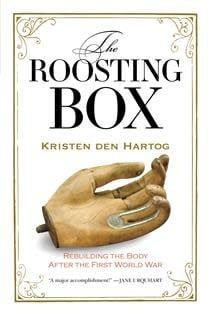The Curious Cat Tea & Books
The Roosting Box: Rebuilding the Body after the First World War by Kristen den Hartog
SKU 9781773103266
C$24.95
In stock: 2 available
Product Details
“A hospital ... is like a roosting box: a communal space that provides ideal but temporary shelter for [the] vulnerable.”
In the aftermath of the First World War, a cash register factory in the west end of Toronto was renovated to treat wounded soldiers returning from war. From 1919 to the 1940s, thousands of soldiers passed through its doors. Some spent the remainder of their lives there.
The Roosting Box is an exquisitely written history of the early years of the Christie Street Hospital and how war reshaped Canadian society. What sets it apart from other volumes is the detail about the ordinary people at the heart of the book: veterans learning to live with their injuries and a world irrevocably changed; nurses caring for patients while coming to terms with their own wartime trauma; and doctors pioneering research in prosthetics and plastic surgery or, in the case of Frederick Banting, in a treatment for diabetes.
Naming chapters after parts of the body, den Hartog chronicles injuries and treatments, and through the voices of men and women, the struggles and accomplishments of the patients and staff. The cast of characters is diverse — Black, female, Indigenous, and people with all sorts of physical and mental challenges — and their experiences, gleaned from diaries, letters, service records, genealogical research, and interviews with descendants, are surprising and illuminating.
An unusual mix of history and story, The Roosting Box offers deeply personal perspectives on healing in the aftermath of war.
Save this product for later
The Roosting Box: Rebuilding the Body after the First World War by Kristen den Hartog
Display prices in:CAD

